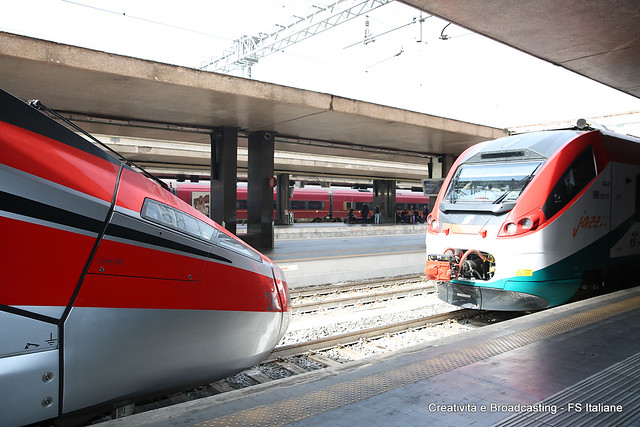CEO Mazzoncini met the associations of disabled persons
CEO Mazzoncini met the associations of disabled persons
Rome, 5 April 2016
A meeting with the associations representing persons with disabilities in order to illustrate the services offered by FS Italiane and its future objectives, and listen to advices, solicitations and requests.
This is in summary what happened at the meeting held today at Roma Termini between the Group’s chief executive officer, Renato Mazzoncini, and the representatives of associations and memberships that protect disabled persons’ rights and demands.
During the meeting, the chief executive officer of FS introduced the Group’s strategic guidelines and objectives to be laid down in the next Industrial Plan. Going then into the specifics, on the issue of disability, Mazzoncini confirmed FS Italiane’s utmost commitment, together with the other players in the mobility sector, to ensure every citizen’s right to travel, none excluded. Every travel – Mazzoncini stressed – is structured around more than one phase and witnesses the involvement of a number of resources, public and shared, and companies, all of them to be deemed allies – in the chiefs executive officer’s words – in the pursuit of the goal of a sustainable, integrated and accessible mobility.
Every participant thanked for the invitation and showed interest in the chief executive officer’s words. Each one, in his own intervention, often moving from the premise of his direct experience of a subjective disability, put forward suggestions and useful indications to improve the services offered by Trenitalia and by Rete Ferroviaria Italiana (RFI), at stations and on trains, by chiefly relying on technological innovations on the one hand and on staff training on the other hand.
The day continued with a visit to the Frecciarossa 1000 and Jazz trains. The visit was not short of suggestions and insightful remarks, gathered by Trenitalia’s technical experts in order to be elaborated and harnessed to good use.
During the following debate, unanimous recognition was lavished on the great work carried out over the years by the companies belonging to Gruppo FS Italiane, thanks also to the dialogue with the associations, aimed at making services ever more accessible. Nowadays – as highlighted by many – it is necessary to work on details, on a series of elements and details, only apparently of minor importance, which might trigger a genuine forward step in the quality of disabled persons’ travels, especially with regard to full access to all the information at stations, on board trains and on the website.
From the ready identification of a seat for the blind to the use of the Wi-Fi, from the visualization of messages on monitors, in sign language as well, down to the dedicated Apps. At the end of the meeting, it was accordingly agreed that these get-togethers should be held ever more frequently and constructively in order to precisely attain these objectives, in light also of the far-reaching renewal of the fleet of regional trains. Trenitalia – as stressed by Mazzoncini during his intervention – has launched a tender for 500 new trains for commuters, for an overall investment of approximately 4.5 billion euros.
Stations
A natural transit hub for mobility consists in railway stations. Those of the most important cities in terms of traffic volume, such as Roma Termini and Milano Centrale, are managed by Grandi Stazioni. There are altogether 14 of them. We then have the intermediate stations, 103 in total, managed by Centostazioni. Lastly, there are more than 2.200 minor stations, the management whereof is entrusted to Rete Ferroviaria Italiana (RFI). The chief executive officer of FS has explained that the work aimed at rendering stations accessible began on the larger ones, for it to gradually extend later to all the other ones through interventions of redevelopment, removal of architectural barriers, improvements in signage and information to the public.
Trains to buses
Mazzoncini explained the technological implementations adopted which have rendered trains increasingly more accessible: from the chance to move autonomously on wheelchair between carriages 3 and 5 (Bistrot) of the new Frecciarossa 1000 (the only train in Europe allowing that), to Trenitalia’s regional trains that envisage full compliance with current European standards. On long-distance trains, in addition to electric trains, Intercity and Frecciabianca trains also boast in their fleet special carriages with dedicated area and toilet. Together with the road transport company Busitalia, moreover, the issue of accessibility to service is being tackled, through dialogues with the associations, since the phase of designing the means.
Blue Halls
The chief executive officer of FS has also focused on the important free of charge services provided from Rete Ferroviaria Italiana’s Blue Halls, which since 2011 has taken up the role of Station Manager. The support service, operating in 273 stations of the national network, is structured around various activities, such as guidance at stations, accompanying disabled passengers to the trains, including through the use of a forklift to enable them to board trains on wheelchairs, transporting the luggage, and providing a wheelchair. Within five years, the support services provided have doubled from around 150.000 annually in 2010 to nearly 300.000 in 2015. A further increase is forecast for 2016.
An extremely high level of satisfaction has been expressed by users, settling at more than 98%, as evinced by opinion polls surveys conducted by external companies.
